PART 1
Conversation with a Six-year-old
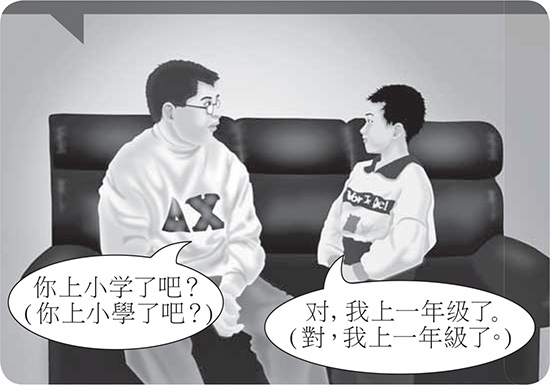
New Characters and Words 
Study the six characters below and the common words written with them, paying careful attention to each character’s pronunciation, meaning, and structure, as well as similar-looking characters. After you’ve studied a character, turn to the Practice Book volume and practice writing it on the practice sheet, making sure to follow the correct stroke order and direction as you pronounce it out loud and think of its meaning.
169 |
喜 |
xĭ |
like, happy, joy |
The radical, at the very bottom, is 口 kŏu “mouth.” This radical is referred to colloquially as 口字底 kŏuzìdĭ “bottom made up of the character 口.” The component making up the top half of the character is 吉 jí “lucky” [BF]. When one is “lucky” and “likes” something, one uses one’s “mouth” to shout for “joy.” |
|||
170 |
欢(歡) |
huān |
happy |
Radical of the simplified form is 又 yòu “again.” Radical of the traditional form is 欠 qiàn “owe.” Phonetic of the traditional form is 雚 guàn “heron” [BF]. The explanation is that when a “heron” swallows a fish, it “owes” the fish thanks and is “happy.” Contrast 欢 ( 歡 ) with 难 ( 難 ) nán (65). |
|||
喜欢 (喜歡) |
xĭhuan |
like [V/AV] |
|
171 |
朋 |
péng |
friend |
Radical is 月 yuè “moon.” The colloquial name for this radical is 月字旁 yuèzìpáng “side made up of the character 月.” The whole character can serve as a phonetic, e.g., in 棚 péng as in 棚子 péngzi “shed,” 崩 bēng as in 山崩 shānbēng “landslide,” and 蹦 bèng “jump.” Contrast 朋 with 明 míng (15). |
|||
172 |
友 |
yŏu |
friend |
又 yòu “again” is both the radical and the phonetic. Contrast 友 with 在 zài (149), 左 zuŏ (165), and 右 yòu (166). |
|||
朋友 |
péngyou |
friend [N] |
|
男朋友 |
nánpéngyou |
boyfriend [N] |
|
女朋友 |
nǚpéngyou |
girlfriend [N] |
|
173 |
真 |
zhēn |
real, really |
Radical is 目 mù “eye” [BF]. This character has an alternate traditional form 眞. |
|||
真 |
zhēn |
really [A] |
|
174 |
级(級) |
jí |
rank, grade |
Radical is 丝 (絲) sī “silk.” When at the left side of a character, this radical is referred to colloquially as 绞丝旁 (絞絲旁) jiăosīpáng “side made up of twisted silk” and is written as 纟(糹). Phonetic is 及 jí “and.” Contrast 级 (級) with 纪 (紀) jì (105). Be especially careful to contrast the words 年级 (年級) niánjí and 年纪 (年紀) niánji “age.” |
|||
年级 (年級 ) |
niánjí |
grade (in school) [N] |
|
几年级 (幾年級) |
jĭniánjí |
which grade? |
|
一年级 (一年級) |
yīniánjí |
first grade |
|
New Words in BMC–SL 6-1 Written with Characters You Already Know 
好吃 |
hăochī |
be good to eat [SV] |
上 |
shàng |
go to, attend [V] |
小学 (小學) |
xiăoxué |
elementary school [PW] |
上小学 (上小學) |
shàng xiăoxué |
attend elementary school |
中学 (中學) |
zhōngxué |
middle school [PW] |
高中 |
gāozhōng |
senior high school [PW] |
高一 |
gāoyī |
sophomore year of high school [TW] |
高二 |
gāo’èr |
junior year of high school [TW] |
高三 |
gāosān |
senior year of high school [TW] |
大一 |
dàyī |
first year in college [TW] |
大二 |
dà’èr |
sophomore year in college [TW] |
大三 |
dàsān |
junior year in college [TW] |
大四 |
dàsì |
senior year in college [TW] |
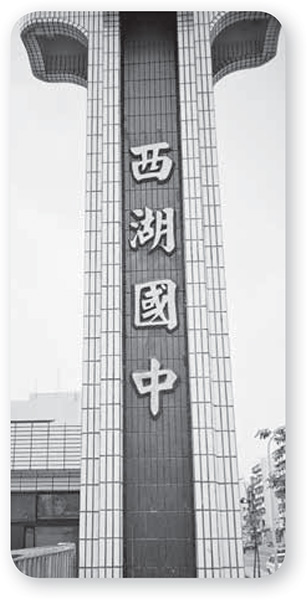
Junior high school in Taiwan
Reading Exercises (Simplified Characters) 
Now practice reading the new characters and words for this lesson in context in sentences, conversations, and narratives. Be sure to refer to the Notes at the end of this lesson, and make use of the accompanying audio disc to hear and practice correct pronunciation, phrasing, and intonation.
A. SENTENCES
Read out loud each of the following sentences, which include all the new characters of this lesson. The first time you read a sentence, focus special attention on the characters and words that are new to you, reminding yourself of their pronunciation and meaning. The second time, aim to comprehend the overall meaning of the sentence.
一、我喜欢北京,可是我的朋友都比较喜欢上海。
二、我们要是没事儿,喜欢去北京饭店吃饭,那儿的饭真好吃。
三、我有两个高中同学,一个叫王安,一个叫万安,他们都是我很好的朋友。
四、朋友,你喜欢吃中国饭吗?里边的东西可好吃了,来吧!
五、要是好吃你就多吃一点儿,要是不好吃你就少吃一点儿。
六、金山大一那年,没有朋友。他今年大四,朋友可真多!
七、明年我要上大二,我的女朋友要上大三。
八、这位同学,你多大了?你上几年级?
九、我的同屋是大一的学生,她的男朋友是大四的学生。
十、大海上大学四年级,文文上高中三年级。
B. CONVERSATIONS
Read out loud the following conversations, including the name or role of the person speaking. If possible, find a partner or partners and each of you play a role. Then switch roles, so you get practice reading all of the lines.
一、
美国太太 :小朋友,你叫什么名字?
中国小朋友 :我叫小明。
美国太太 :小明,你几岁了?
中国小朋友 :六岁了。
美国太太 :你上小学了吧?
中国小朋友 :对,上一年级了。
美国太太 :来,这是你的。你喜欢不喜欢?
中国小朋友 :我很喜欢,谢谢!真好吃!
二、
男:你有没有男朋友?
女:我有男的朋友,可是没有男朋友。
男:你喜欢我吗?
女:你别问我这个!
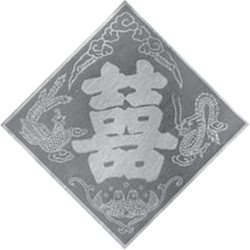
“Double happiness”
C. CHARACTER DIFFERENTIATION DRILLS
Distinguish carefully the following similar-looking characters, pronouncing each one out loud and thinking of its meaning.
一、友 友 友 右 右 右
二、友 友 友 左 左 左
三、友 友 友 在 在 在
四、友 在 左 右 左 右 友 在
五、级 级 级 纪 纪 纪
六、年级,年纪,年级,年纪
七、欢 欢 欢 难 难 难
八、欢 难 难 欢 欢 难 欢
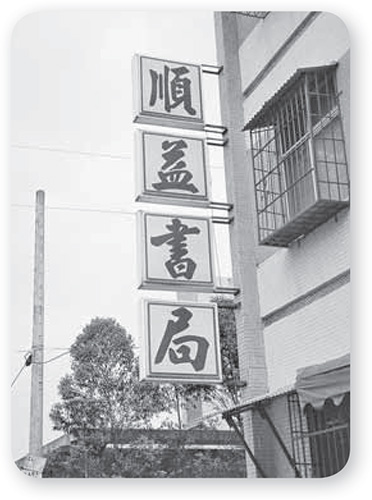
Taiwanese bookstore
D. NARRATIVES
Read the following narratives, paying special attention to punctuation and overall structure. The first time you read a narrative, read it out loud; the second time, read silently and try to gradually increase your reading speed. Always think of the meaning of what you’re reading.
一、 |
什么叫“好朋友”?你有事儿可以去找他,他有事儿也可以来找你,这个叫好朋友。坐在那边的那个人就是我的好朋友小王。他的名字叫王大川,他是天津人,今年三十岁。我们小学、中学都是同学。上了大学,大一、大二、大四我们是同屋。我很喜欢小王,小王也很喜欢我。我们两个是好朋友! |
二、 |
我去老李的公司找老李,可是老李不在。我问老钱老李在哪儿,可是老钱也不知道老李去什么地方了。老钱要我先在他们公司里吃饭。他们公司的饭真好吃! |
Reading Exercises (Traditional Characters) 
A. SENTENCES
Read out loud each of the following sentences, which include all the new characters of this lesson. The first time you read a sentence, focus special attention on the characters and words that are new to you, reminding yourself of their pronunciation and meaning. The second time, aim to comprehend the overall meaning of the sentence.
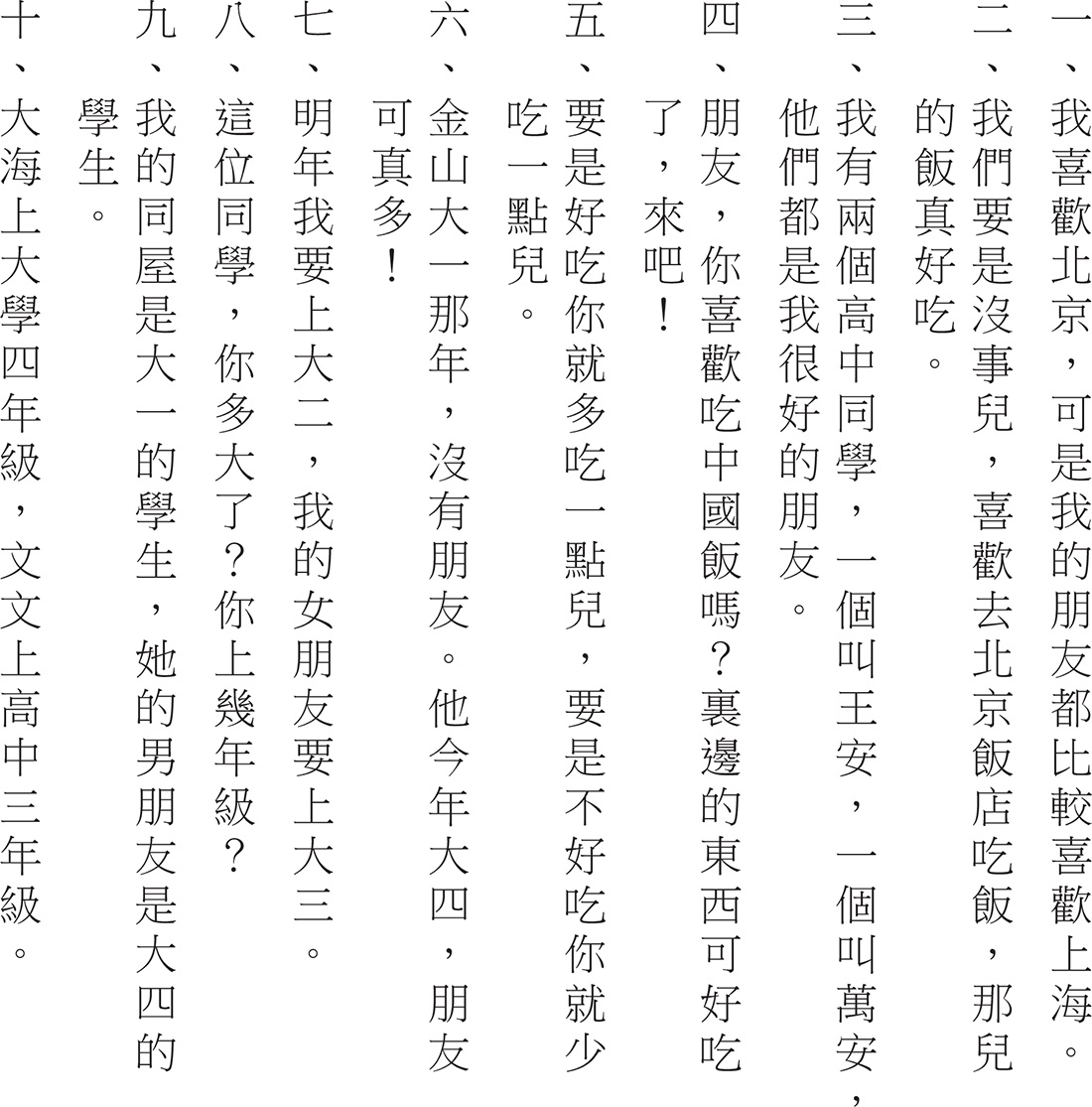
B. CONVERSATIONS
Read out loud the following conversations, including the name or role of the person speaking. If possible, find a partner or partners and each of you play a role. Then switch roles, so you get practice reading all of the lines.

C. CHARACTER DIFFERENTIATION DRILLS
Distinguish carefully the following similar-looking characters, pronouncing each one out loud and thinking of its meaning.
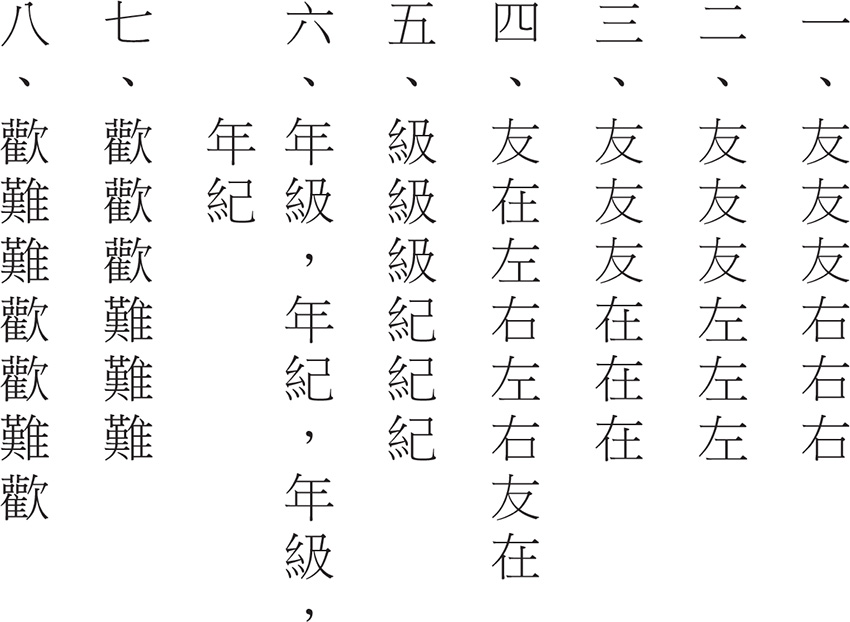
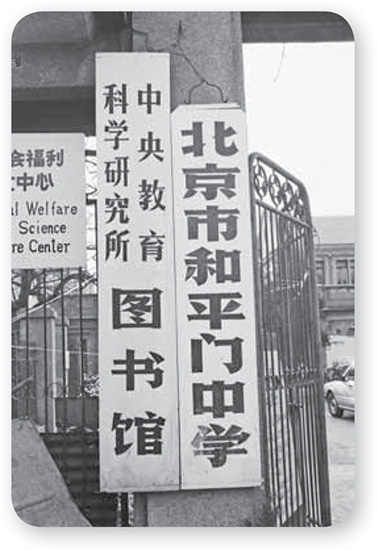
Middle school in Beijing
D. NARRATIVES
Read the following narratives, paying special attention to punctuation and overall structure. The first time you read a narrative, read it out loud; the second time, read silently and try to gradually increase your reading speed. Always think of the meaning of what you’re reading.
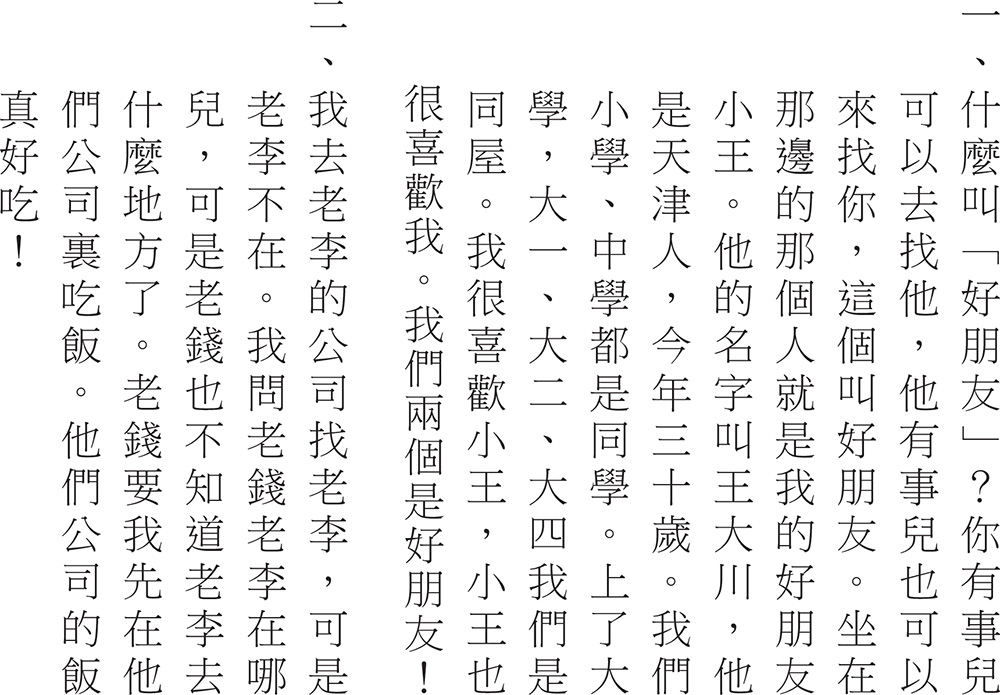
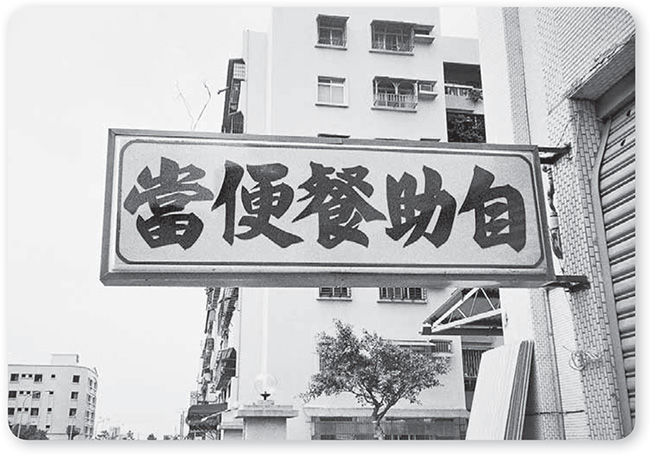
“Buffet and lunch boxes” (written from right to left)
Notes
A4A. 朋友 is here used as a vocative. That is, it is addressed to someone and said to attract their attention, much as in English we might say “Hey, friend, could you do me a favor?”
A4B. 里边 (裏邊) “inside” here probably refers to “inside” a restaurant.
A4C. 东西 (東西) “things” can be used to refer to food; in fact, 吃的东西 (吃的東西) is a common way to say “things to eat” or “food.”
A5A. 要是……就…… means “if…then….”
A5B. 多吃一点儿 (多吃一點兒) means “eat a little more.” Similarly, 少吃一点儿 (少吃一點兒), which occurs later in this same sentence, means “eat a little less.”
A6A. 金山大一那年 should be parsed as follows: 金山 + 大一 + 那年. Hints: 金山 is a person’s name, and 大一 is an abbreviation of 大学一年级 (大學一年級).
A6B. 他今年大四,朋友可真多!” He’s a senior this year, and he has really many friends!” (lit. “He this year university fourth grade, friends indeed really many!”)
A8. 这位同学 (這位同學), literally “This classmate,” is here said to address the student concerned and attract her or his attention. The best English equivalent might be “Excuse me, young lady” or “Excuse me, young man.” 这位同学 (這位同學) could be said by anybody (e.g., a visitor to the school), not only by a fellow classmate.
B1. 小朋友, literally “Little friend,” is often used to address children whose name one doesn’t know, much like English “Little boy” or “Little girl.”
B2. For many Chinese speakers, there is a distinction between 男朋友 “boyfriend” and 男的朋友 “male friend,” or between 女朋友 “girlfriend” and 女的朋友 “female friend.”
D1A. 你有事儿可以去找他 (你有事兒可以去找他) “When you have something (you need help with, you) can go seek him out.”
D1B. 坐在那边的那个人 (坐在那邊的那個人) “That person (who is) sitting over there.”
D2. 老钱要我先在他们公司里吃饭 (老錢要我先在他們公司裏吃飯) “Old Qian wants me to eat in their company first.” Regarding 他们公司里 (他們公司裏), note that there is often no 的 between a personal pronoun and the word 公司, because the connection between a person and her or his company is considered so close. Also, in China many larger companies have dining rooms or canteens for their employees, so it’s sometimes possible to invite a person from the outside to join one for a meal in one’s company.
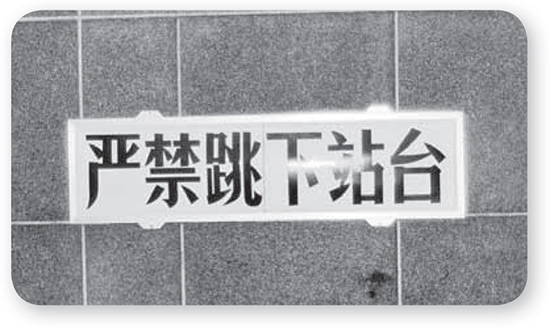
“It’s strictly prohibited to jump down from the (train station) platform”